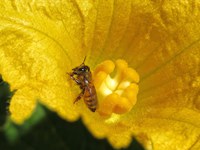Dakota Gardener: Attract bees to your vegetable garden
(Click an image below to view a high-resolution image that can be downloaded)
By Tom Kalb, Horticulturist
NDSU Extension
We need bees to grow a productive vegetable garden.
Almost all cucumber, melon, pumpkin and squash flowers require pollination by bees to produce fruit. Without bees, there would be a worldwide shortage of zucchini. A very sad thought, indeed.
Tomato, pepper and eggplant flowers do not need to be pollinated by bees, but the vibration of bee wings on their flowers can increase yields.
A few bees are not enough. We want lots of bees. Fruit-bearing flowers are generally receptive for pollination for only one day. In many cases, these flowers require multiple visits by bees on that day to produce quality fruit.
How can we attract bees to our vegetable gardens?
Bees, like every creature, need food. They need food from spring through fall. You can attract bees by growing a mix of flowers that provide nectar and pollen throughout the growing season.
Grow your flowers in a nearby plot or intermix the flowers among the vegetable plants. Flowers grown in clusters will be especially visible and attractive to foraging bees.
Cosmos, marigolds, sunflowers and zinnias are easy-to-grow annuals and will attract bees. Hardy perennials such as coneflower, blazing star, rudbeckia, sedum and aster will attract bees through the summer until frost.
Herbs are a great addition to a vegetable garden. The blooms of basil, bee balm, borage, chives, thyme and sage will draw bees to your garden.
Bees, like every creature, need water. Bees get especially thirsty during warm, sunny days. Having a birdbath or something as simple as a shallow tray of fresh, clean water nearby will keep bees coming to your garden. Place a few rocks in the water to provide bees a place to land on.
Bees, like every creature, need a safe shelter. Bee houses filled with hollow tubes will be used by cavity-nesting bees. These bee houses are available online and at many garden centers. Many bees nest in the ground. A patch of dry, bare soil in your yard may attract these bees.
You can protect bees by limiting your use of insecticides. Bees are insects, and most insecticides will kill bees.
If you see an insect in your garden, identify the insect and make sure it is a pest. Over 90% of the insects in your garden are beneficial or neutral to us. There are only a few troublemakers like aphids and potato beetles. You can take a photo of a mystery insect in your garden and e-mail it to your local NDSU Extension agent or me to identify.
If you have an insect pest problem, use a natural insecticide that is less toxic to bees. Neem causes minimal risk to bees. Spinosad has little effect on bees after it has dried. Spray in the evening hours when bees are much less active. Avoid spraying the blooms directly.
The recipe for attracting bees to your vegetable garden is simple. Provide them with abundant food, fresh water and safe shelter. These ingredients will lead to a garden that is both beautiful and bountiful.
For more information about gardening, contact your local NDSU Extension agent. Find the Extension office for your county at www.ndsu.edu/agriculture/extension/county-extension-offices.
NDSU Agriculture Communication – June 18, 2025
Source: Tom Kalb, 701-877-2585, tom.kalb@ndsu.edu
Editor: Kelli Anderson, 701-231-6136, kelli.c.anderson@ndsu.edu




